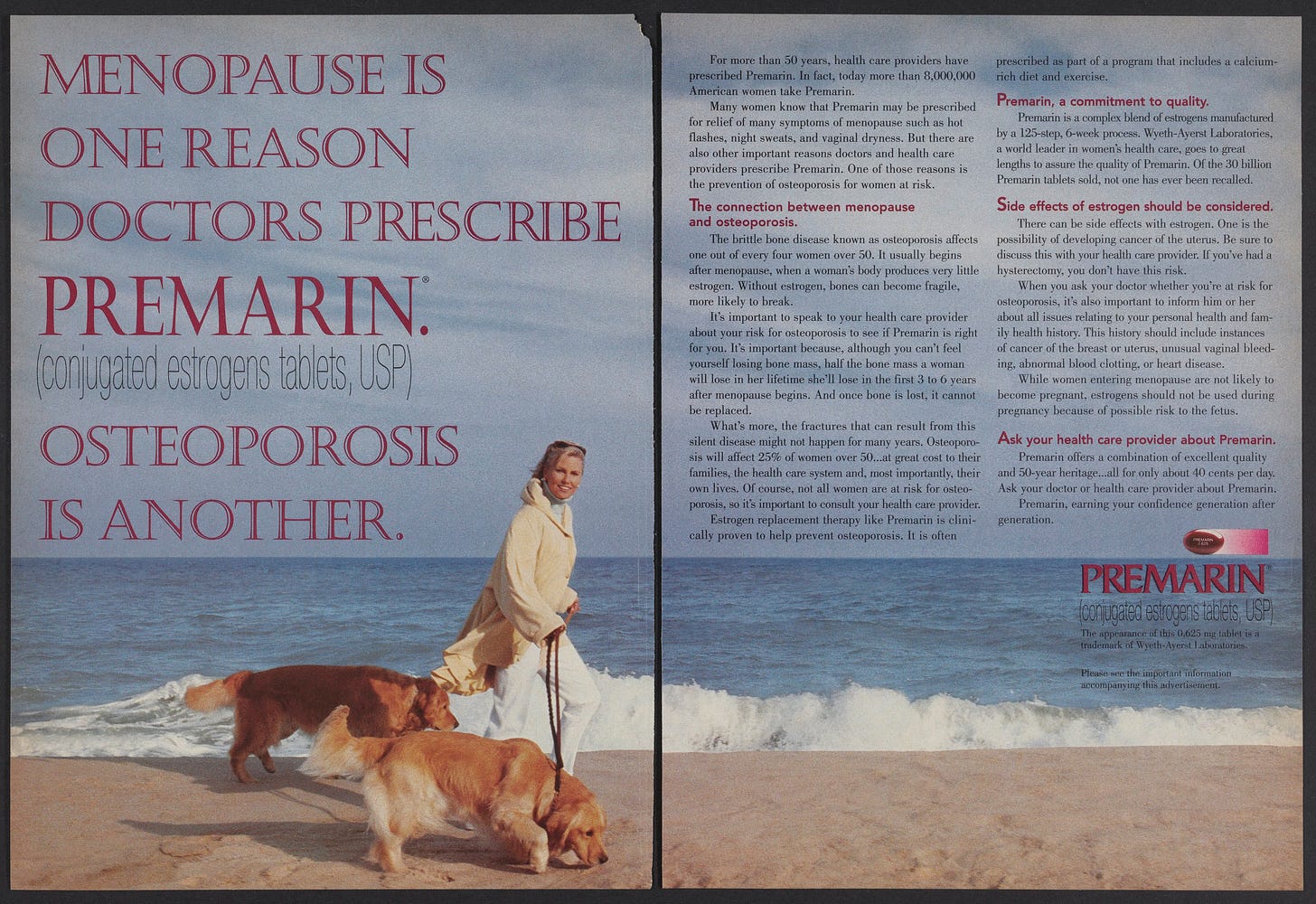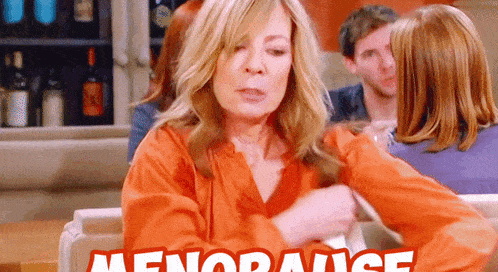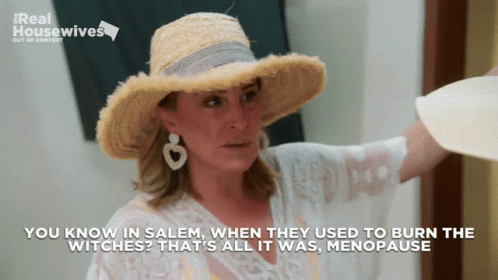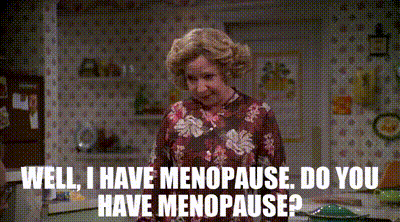Heroine. Rebel. Trailblazer. | Could HRT bring down the patriarchy?
How menopause awareness stacks, er, up to erectile dysfunction and why it matters.
When I realized that I hadn't had a period in more than a year, I thought, Hazaah! I'm in menopause!! Relief is in sight. Little did I know.
At the risk of over-indexing on menopause content, I was inspired by a dear friend’s recent Facebook post about the dearth of menopause research and medical support and destigmatizing this natural, messy, challenging, hopeful phase of life. Let’s talk about it. Join the AMID LIFE community for more conversations about menopause and what comes next.
A few months later, I wrote the following in my journal.
Menopause has been kicking my ass. I can't sleep. I'm irritable and foggy. Four or five hot flashes a night. I sleep and wake up every two hours, soaking wet, burning from the inside out. By the time I change my PJS and get back in bed, I'm freezing. Rinse and repeat.
I saw my gynecologist yesterday and will be starting HRT (hormone replacement therapy) asap. Turns out the risks I heard about were overplayed, and the benefits (short and long-term) are many.
I suppose they don't tell us about meds because they want us to stay fuzzy. I swear it's about keeping women in their place.
Hope. Reset. Trust.
Flash forward to today. I've been taking Progesterone and Estrogen for six years. Six years without a single hot flash. Six years of good sleep. Six years of (relatively) reduced mood swings. Six years of energy. Six years of clarity.
How is it possible that pharmaceutical menopause therapies didn't occur to me as a solution for my misery?
Honestly, I hadn't connected the hormonal dots to any of my symptoms beyond hot flashes and irritability. What did my ebbing estrogen have to do with the volatile mix of fatigue and restlessness that smoldered under my skin, the throbbing regret and self-doubt, the burning desire for something undefinable?
Somewhere deep in my brain index, I'd filed scary side effects and risks of HRT and didn't bother to look further. Pharmaceuticals were not for me, I declared, while mainlining Advil, muscle relaxers, and prescription migraine meds.
Jars of impulse purchases like Black Cohosh and St. John's Wort sat unopened on my kitchen counter after I looked up the short-term side effects—headache, fatigue, dizziness, restlessness, anxiety, sexual dysfunction, and light sensitivity. Frankly, the pills seemed redundant.
Compounded bioidenticals appeared in internet searches that called back to Suzanne Somers' 2009 appearance on Oprah. Promoting her book, Ageless, the actress and amateur scientist promised youth and sexiness with bioidentical hormones without the risks of estrogen and progesterone.
And by no risk, I'll give her the benefit of the doubt and assume she meant increased risk of blood clots, stroke, and breast cancer, cardiovascular disease, endometrial cancer, bloating, breast tenderness, weight gain, and mood swings, because that is what the data on bioidentical hormones show. Moreover, these compounded drugs are not subject to FDA oversight1, which increases the risks of inconsistent dosages and product safety concerns.
Hell yes. Rise. Triumph.
When I was in perimenopause, menopause was a joke.
And, menopause health information was missing or unreliable.
I can't imagine what my life would be like today if I'd missed the boat on HRT. I am forever grateful to my gynecologist for clueing me in to the risks and benefits of hormone therapy, why I was a good candidate, and how it would help me manage (but not cure) my specific symptoms.
I was 57 and this was the first meaningful, informed conversation I'd had on the topic.
Was my menopausal health ignorance the result of:
a) A marketing ROI problem
b) A social/political strategy to keep women in their place—specifically wise older women no longer raising or capable of having children. Women with inner wisdom, experience, and no fucks left to give are dangerous, you know.
c) All of the above
Does menopause have an ROI problem?
Let's compare menopause drug advertising to erectile dysfunction advertising. But first, let's stipulate that companies and (well-meaning) governments increase spending when the profit potential (cash or societal) is higher.
When was the last time you watched the news or a sports broadcast without seeing a pharmaceutical company advertising erectile dysfunction drugs? (You're picturing the side-by-side bathtubs right now, aren't you?)
Okay. When was the last time you saw a pharmaceutical company advertising drugs for menopausal symptoms—vasomotor (hot flashes, night sweats), vaginal atrophy, sleep disturbances, brain fog, mood swings, irregular periods?
The emphasis on pharmaceutical companies is important. There is a celebrity-heavy market exploding with promises of menopause relief. Very few (possibly none) of the products in these categories have undergone rigorous peer-reviewed testing.
When the Women's Health Study2 reported initial results in 2002, increased incidents of cancer and heart disease made headlines. Panic ensued. Doctors stopped prescribing, and the pharmaceutical industry pulled back on ad spending virtually overnight. Ad budgets have never bounced back.

Can we blame the patriarchy for low menopause awareness?
Erectile dysfunction drugs may increase the risk of cardiovascular issues and melanoma in some patients, but the only side effect that went viral (with a wink) was a 4-hour erection3. Despite these risks, ad spend promoting ED medications in 2019 was $6.1 billion.
Ad spend on menopause drugs in 2024 totaled $45.2 million. Not a typo.
The pharmaceutical industry spends 125 times more on driving awareness for a medical condition that serves 30 million men than they do on promoting solutions for menopause symptoms, which impact twice as many women.
The market size data is clear. According to Forbes, women over 50 account for 27% of consumer spending, with a collective purchasing power exceeding $15 trillion.
Since the dawn of time, society has prioritized reproductive potential—virile men and fertile young women. Therefore, erectile dysfunction is a crisis, while menopause is the natural end of a woman's value to society. Bye, Felicia.
That's why we research, market, and sell ED meds for men and anti-aging beauty products to women.
Heroine. Rebel. Trailblazer.
If menopausal women were at full mast, powered up—erect, as it were—with widely available and accurate information, destigmatized representation, and tested clinical hormone therapies, then the existing male power structures would be at risk.
Because when you are awake and well and empowered, you are less likely to be held down by systems that never served you.
The answer is all of the above—but not for long. Our job? Share our stories. Reject the shame. Change the conversation on menopause therapies.
What’s your story?
Work hard. Be brave. Believe.
Catherine
This could change given recent FDA cuts.
Yippee ki yay! Said no one I know.






I had this VERY conversation with a doctor two weeks ago. I said I had been losing a lot of hair. She said it was pretty normal for pre-menopausal and menopausal women. And then she said, "But of course, your OBGYN would never have told you that because nobody studies menopause. They were too busy working on their viagra." Never truer words were spoken.
Society has prioritized reproductive potential... menopause is natural end to women's value to society.... why we sell anti-aging products to women. Never thought about these connections before. Very interesting